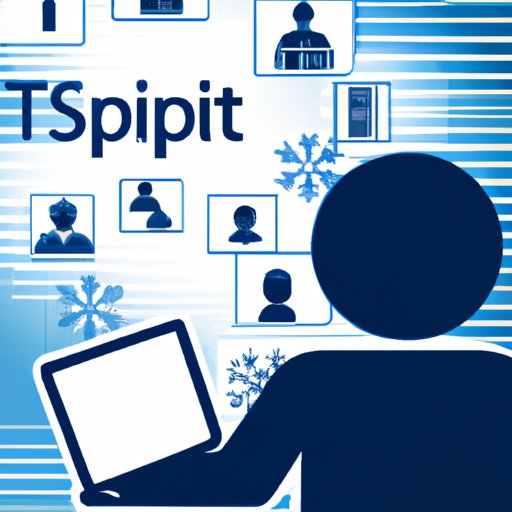Introduction
An information technology (IT) specialist is a professional who is responsible for managing, developing and maintaining computer networks, systems and software. They are often the first point of contact for any IT related issues in an organization and are expected to provide technical support, troubleshoot problems and ensure that the IT infrastructure runs smoothly. As such, IT specialists need to be knowledgeable about all aspects of IT, from hardware and software to networking and security.
A Day in the Life of an Information Technology Specialist
The day-to-day tasks of an information technology specialist vary depending on the type of IT job they have. In general, however, they may be responsible for installing and configuring new software and hardware, monitoring system performance, researching and resolving technical issues, providing technical support to users, and setting up user accounts. They may also be involved in more complex tasks such as designing, testing and implementing network security measures, and creating and maintaining databases.
In addition to these routine tasks, IT specialists are also often called upon to troubleshoot complex technical problems, develop innovative solutions to existing issues, and install or upgrade existing systems or software packages. They may also be asked to give presentations or training sessions to help educate other staff members about the latest technologies. The work of an IT specialist can be both challenging and rewarding, and it requires a great deal of problem solving and creative thinking.
What Education and Training is Required to Become an Information Technology Specialist?
Most employers require information technology specialists to have at least a bachelor’s degree in computer science or a related field. Additionally, some employers may also require certifications such as CompTIA A+ or Microsoft Certified Solutions Associate (MCSA). Along with formal education, many IT specialists also gain experience through internships or on-the-job training.
What Skills Do Information Technology Specialists Need?
To be successful in the role of an information technology specialist, there are certain skills that are essential. These include both technical and soft skills. Technical skills refer to the ability to understand and use various types of software, hardware, and networks. Soft skills refer to the interpersonal skills needed to interact with people effectively, such as communication, problem solving, and customer service.
According to a study by the Association for Computing Machinery, “Soft skills are increasingly important for IT professionals, as they must be able to communicate effectively with colleagues, clients, and customers to explain complex technical concepts in plain language.”
What Are the Different Types of Information Technology Specialists?
Information technology specialists can specialize in different areas of IT, such as system administration, network engineering, database administration, software development, and web development. Each specialization requires its own set of skills and knowledge. For example, system administrators are responsible for maintaining computer systems, while network engineers design, implement, and manage computer networks.
Database administrators are responsible for designing, implementing, and maintaining databases, while software developers create and maintain software programs. Finally, web developers design and build websites and web applications.
How Does the Job of an Information Technology Specialist Differ from Other IT Jobs?
The job of an information technology specialist differs from other IT jobs in terms of knowledge and skill requirements, as well as work environments. IT specialists typically need to be knowledgeable about hardware, software, networking, and security. They also need to be comfortable working in a variety of work environments, from corporate offices to data centers.
In contrast, other IT roles may require specialized knowledge in one area, such as software development or database administration. Additionally, other IT roles may require the ability to work in a specific environment, such as a server room, or with a specific type of software or hardware.
What Are the Benefits of Becoming an Information Technology Specialist?
One of the major benefits of becoming an information technology specialist is the financial rewards. According to the Bureau of Labor Statistics, the median annual salary for IT specialists was $88,240 in 2019. In addition to competitive salaries, IT specialists also benefit from job security, as the demand for qualified IT professionals is projected to continue to grow over the next decade.
What Career Opportunities are Available for Information Technology Specialists?
The career opportunities for IT specialists are vast and varied. IT specialists can advance their careers by taking on additional responsibilities, such as managing projects or implementing new technologies. They can also pursue specialized roles, such as software developers or network engineers. Additionally, IT specialists may also move into higher-level positions, such as IT directors or chief technology officers.
Conclusion
The role of an information technology specialist is vital in today’s digital world. IT specialists are responsible for managing, developing and maintaining computer networks, systems and software. To be successful in this role, an IT specialist needs to have a combination of technical and soft skills, as well as a solid understanding of hardware, software, networking, and security. Furthermore, the job offers financial rewards, job security, and advancement opportunities.
Overall, the role of an information technology specialist is an exciting and rewarding one, and those who pursue it can look forward to a long and successful career.
(Note: Is this article not meeting your expectations? Do you have knowledge or insights to share? Unlock new opportunities and expand your reach by joining our authors team. Click Registration to join us and share your expertise with our readers.)
